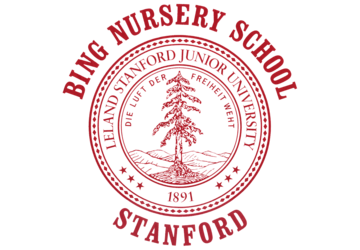Ready, Set, Go! Helping Your Child’s Transition to Kindergarten

By Amy Shin, Teacher
As children get close to entering kindergarten, many questions emerge for parents and teachers hoping to make the transition as smooth as possible. To help answer these questions, Stephanie Agnew, assistant director at the Parents Place in the Peninsula, a family resource center, joined us at our annual kindergarten information night on Jan. 15. A mix of prospective kindergarten parents and Bing teachers was in attendance.
Parents often ask Agnew, “What would the best kindergarten look like?” Agnew’s answer: “There’s no one type of school that’s the best.” At the Bing event, she suggested that parents should instead pose questions such as: What is my child like? How does she like to learn and socialize? What is our family like? What kind of educational philosophy do I want for my child’s school? Questions such as these will lead to a clearer understanding of the school that’s right for your family. Agnew emphasized that elementary school is where children learn to love learning. Building the perception of school being fun, exciting, and a social center for families is essential because it will encourage children to make good intellectual and social choices.
One way to foster this love of learning is to prepare children with the tools to be confident and independent in their day-to-day activities. According to a study by the First Five Organization in California (see http://bit.ly/first5-school-readiness), which surveyed kindergarten teachers, a child’s self-care and motor skills are foundational for kindergarten readiness. Self-care refers to a child’s ability to be independent in taking care of themselves—for example, getting dressed, setting up lunch and using the bathroom. When children feel capable, they are confident, and therefore ready to learn and apply new concepts, Agnew said.
Social-emotional skills such as self-regulation provide additional building blocks for kindergarten readiness. Knowing how to resolve conflicts, advocate for oneself and manage impulses enables children to engage more deeply in the classroom. Some ways to support these skills at home are to provide a space for children to speak openly, to nurture their ability to articulate their feelings, and to help them find strategies for coping with different emotional states. Agnew also suggested setting clear boundaries at home to promote the development of self-regulation skills.
The final building block for kindergarten readiness is kindergarten academics. Some of the essential kindergarten academics skills are recognizing letters, colors, numbers and shapes, and having some awareness of phonics—for example, being able to identify rhyming words. Finding opportunities to integrate these skills into everyday situations can help children acquire them. Oftentimes, parents place the greatest importance on academics, but Agnew highlights self-care and social-emotional skills as being foundational for a healthy academic setting and a smoother transition to the next school environment.
To create a positive outlook on kindergarten, Agnew suggested waiting until the summer before kindergarten starts to talk with children about what to expect in kindergarten. Providing an overview and talking about how children are feeling allow for familiarity as they enter a new environment. She also suggested refraining from overusing the phrase “kindergarteners do (or don’t do) …,” because it might put too much pressure on children. Reading together and visiting engaging play areas such as parks and museums will help children build skills in problem-solving, social interaction, and communication, which will serve them well in kindergarten.
To conclude the event, Adrienne Lomangino, head teacher at Bing, presented the data she collected from former Bing parents on children who have transitioned to kindergarten in the past year. Her survey showed that of the 117 participants, 73% attended public school, while 27% went to private school. When asked about their child’s overall transitional experience, 82% of parents said it was easy or somewhat easy, while just 3% said it was difficult. Much of the advice from prior Bing parents supported Agnew’s suggestions on connecting with the community, talking about kindergarten just prior to entry, and avoiding overscheduling to give children some downtime. Former Bing parents conveyed the importance of remembering how every child is unique and will be on their own journey. The best thing for parents to do is to stay calm and be positive and empathetic through the peaks and valleys of transitioning to elementary school.